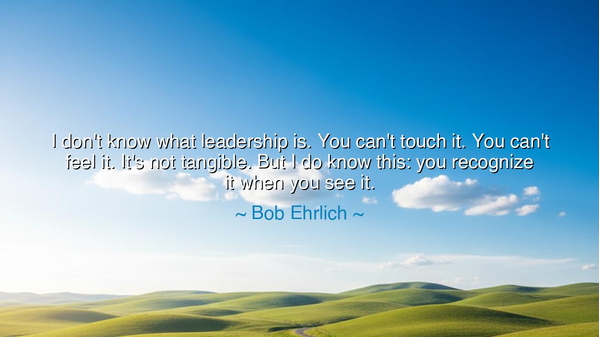
I don't know what leadership is. You can't touch it. You can't
I don't know what leadership is. You can't touch it. You can't feel it. It's not tangible. But I do know this: you recognize it when you see it.






The words of Bob Ehrlich rise like a riddle of the ancients: “I don’t know what leadership is. You can’t touch it. You can’t feel it. It’s not tangible. But I do know this: you recognize it when you see it.” This saying strikes at the heart of the mystery of leadership, a force both unseen and undeniable. Like the wind that bends the trees yet cannot be grasped in the hand, leadership eludes the senses, yet its presence shakes the soul. It cannot be weighed like gold or measured like stone, yet it changes the course of armies, nations, and generations.
For truly, what is this thing called leadership? Is it authority written in law? Is it command backed by power? Or is it something deeper, woven into the spirit of those who rise above the rest? Ehrlich confesses that it is not a thing one can seize, but a quality that reveals itself in action. It is known not by definition, but by recognition. One cannot name its essence, but one can see its light burning in another’s deeds. The ancients might have called it virtus—a divine spark that marks a mortal as greater than himself.
Think upon the story of Winston Churchill in the darkest days of World War II. Before him stood no crown of invincibility, no assurance of triumph. Britain was battered, her allies fallen, her people weary. Yet when Churchill spoke, the hearts of his countrymen burned anew. His words, his courage, his presence—they could not be bottled, weighed, or dissected, yet all who heard him knew: here was leadership. The bombs fell, the cities crumbled, but his invisible strength held the nation firm, and through that unseen power, history turned.
This is why Ehrlich’s words ring true. Leadership is not tangible; it is not the throne or the title, but the spirit that animates them. You cannot purchase it with wealth, nor inherit it by blood. But when it stands before you, when a man or woman bears themselves with vision, courage, and sacrifice, you know it beyond doubt. The soldiers on the battlefield feel it in their bones. The people in their despair cling to it as to a beacon. It is not defined, it is revealed.
And yet, this truth must not lead us into passivity, as though leadership were only for the chosen few. Though its essence is mysterious, its seeds dwell in every heart. The one who stands firm in hardship, who inspires trust through honesty, who sacrifices self for others, is walking the path of the leader. Even if the world does not yet recognize it, those near them will feel it, will know it, will see it. Thus leadership is not taught like arithmetic, but cultivated like character, ripened by trial, and proven in action.
The lesson, then, is clear: do not chase the shadow of leadership as if it were a crown to be won. Instead, live in such a way that its invisible flame may kindle within you. Be steadfast in your word, faithful in your duty, and fearless in your service. When storms rise, do not retreat. When others falter, stand firm. And though you may not call yourself a leader, those around you will recognize it when they see it.
So let us carry this teaching forward. Seek not the outward marks of power, but the inward strength of spirit. Do not waste your life asking, “What is leadership?” for the answer lies not in words, but in deeds. Instead, act with courage, speak with truth, and serve with love. Then, like the wind unseen but mighty, you shall be felt by all, and those who look upon you will know—though they cannot name it—that leadership has entered their midst.
Thus Ehrlich speaks the wisdom of the ages: though leadership is intangible, it is undeniable. And the world, aching for guidance, does not ask you to define it—it asks you to embody it.






AAdministratorAdministrator
Welcome, honored guests. Please leave a comment, we will respond soon